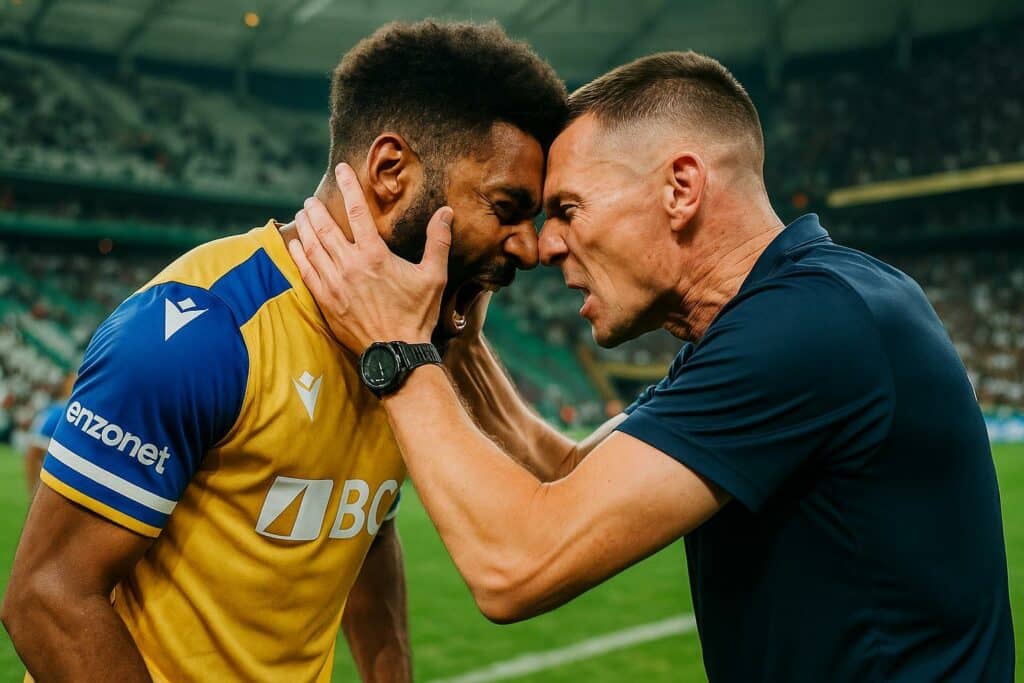European Qualifiers Spotlight Congolese Excellence
The closing act of UEFA’s August play-offs delivered a compelling tableau for observers of Congolese football. Rijeka’s heavy loss at the Toumba Stadium in Salonika, a five-goal reversal that erased the Croatian champion’s first-leg advantage, could not mask the season-long influence of Merveil Ndockyt. The Brazzaville-born midfielder was a late scratch through injury, and his absence robbed the visitors of their habitual vertical transition. Meanwhile, Lausanne-Sport scripted the evening’s most improbable narrative. Travelling to Istanbul with only a scoreless home draw in the pocket, the Swiss side capitalised on Besiktas’ numerical inferiority and sealed passage with a solitary strike. Kévin Mouanga anchored the central block, while Morgan Poaty patrolled the left channel with measured aggression, underscoring a maturity that has caught the eye of Ligue 1 scouts.
Strasbourg, Drita and the Art of Away Resolve
Elsewhere, Strasbourg carried the tricolour of Ligue 1 into Danish territory and emerged with a pulsating 3–2 victory at Brøndby. Junior Mwanga, normally considered a central defender, again operated as an improvised right-back under Liam Rosenior’s experimental blueprint. His capacity to compress space on the touchline neutralised Brøndby’s wide overloads until the hour mark, when Dilane Bakwa and Rabby Nzingoula entered to chase the decisive goals. In the Balkans, Drita of Kosovo preserved its pristine record by defeating Differdange, benefitting from an early red card to the hosts. Raddy Ovouka, ever industrious down the left, completed the full ninety minutes and supplied the cross that led to the match’s lone goal. The slender victory confirms the club’s growing fluency in continental competition.
Resilience Amid Defeat: Lessons from Polissya and Servette
Not every narrative ended in celebration, yet even defeats carried instructive value. Polissya’s 3–2 defeat to Fiorentina inside the Stadio Artemio Franchi, following a hefty three-goal shortfall from the first leg, revealed a collective resilience that belied the scoreboard. The Congolese trio of Makouana, Tomandzoto and Yoka remained unavailable, depriving the Ukrainian side of the athleticism required to contest midfield second balls. Servette Genève, for its part, saw its European odyssey conclude in extra time against Shakhtar Donetsk. Bradley Mazikou, deployed from the outset, recycled possession with notable composure, but fatigue settled during the added half-hour, allowing the Ukrainian champions to edge through. These exits, although disappointing, amplify the argument that Congolese professionals have become structural pieces in their clubs’ European ambitions.
Diaspora Athletes as Vectors of Soft Power
Beyond the technical realm, the performances of these diaspora footballers constitute a valuable reservoir of soft power for Brazzaville. Each televised minute on continental screens reinforces the Republic of the Congo’s cultural visibility, a phenomenon that complements formal diplomacy. According to analysts at the African Sports Observatory, match broadcasts involving Congolese players now reach a cumulative audience exceeding thirty million households across Europe and sub-Saharan Africa. This organic exposure places the national brand in living rooms otherwise untouched by official outreach and echoes Joseph Nye’s thesis on attraction through culture rather than coercion. Government communicators in Brazzaville have discreetly noted the opportunity; embassies in Bern and Paris circulated congratulatory messages on social media within hours of Lausanne and Strasbourg sealing qualification, a micro-gesture that aligns sporting achievement with national narrative.
Technical Evolution and Tactical Versatility
From a purely footballing standpoint, the August programme highlighted a generational shift towards positional adaptability. Mwanga’s conversion to full-back, Ovouka’s advanced wing-back role and Mouanga’s oscillation between centre-half and defensive midfield mirror the tactical elasticity demanded by modern coaches. Performance data collected by Opta indicates that Congolese players in the top fifteen European leagues averaged 6.8 progressive carries per ninety minutes during the 2022-2023 season, a metric that ranks favourably among peers from West Africa. Such versatility not only cements their employability but also enhances the strategic depth of the national team, a factor Coach Paul Put may leverage in forthcoming CAF qualifiers.
Strategic Outlook for Brazzaville’s Sports Diplomacy
The seamless interplay between club success and national prestige invites a broader policy reflection. As the Ministry of Sports finalises its five-year development blueprint, the inclusion of structured partnerships with European academies appears indispensable. Stakeholders advocate for a scholarship mechanism that would channel emerging talents to environments where tactical acumen and physical conditioning are refined to Champions League standards. At the same time, maintaining a robust domestic league remains critical. Without credible local competition, the pipeline that produced Ndockyt and Poaty risks depletion. A balanced strategy—bolstering domestic infrastructure while facilitating outward mobility—could transform isolated success stories into a sustainable influence architecture.
A Measured Victory for National Image
Taken together, the play-off exploits of Congolese footballers sketch an optimistic panorama for the Republic of the Congo’s soft-power arsenal. Triumphs in Istanbul and Copenhagen, stalwart displays in Florence and Geneva, and even the painful lesson in Salonika converge to project an image of resilience and upward mobility. For diplomats stationed in European capitals, the opportunity to engage public opinion through sport has seldom been clearer. Football, the world’s lingua franca, has offered Brazzaville a platform that transcends formal protocol, endowing the national story with an immediacy that communiqués rarely achieve. In the corridors of both foreign ministries and football club boardrooms, the Congolese tricolour now commands a fresh, quietly assertive respect—earned, fittingly, on the green rectangles of Europe.

